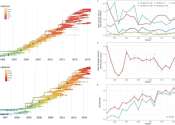'Benign' malaria key driver of human evolution in Asia-Pacific
The malaria species rampant in the Asia-Pacific region has been a significant driver of evolution of the human genome, a new study has shown. An international team of researchers has shown that Plasmodium vivax malaria, the ...
Sep 4, 2012
0
0





